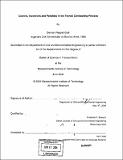Control, incentives and penalties in the transit contracting process
Author(s)
Raspall Galli, Demian, 1973-
DownloadFull printable version (15.01Mb)
Other Contributors
Massachusetts Institute of Technology. Dept. of Civil and Environmental Engineering.
Advisor
Frederick P. Salvucci.
Terms of use
Metadata
Show full item recordAbstract
The last decade of the twentieth century was characterized by financial and budget constraints in almost all government activities. Transportation was no exception, and many countries moved to private operation as a way to reduce their need for operating and capital subsidies, and acquire technical competency to produce higher quality public services. Private participation, however, may require the implementation of a regulatory instrument to ensure the accomplishment of public goals. The most common form of regulation for large transit systems is the use of concession contracts. They govern the relationship between the government and the private provider, converting government's objectives into the economic variables that guide the private firm behavior. This thesis analyzes a variety of issues that should be considered by a government agency studying private involvement in transit operations by bringing together concepts from different fields such as economics, law, political science, negotiation, policy making, engineering, and transportation science. First the entire menu of alternatives for private participation and regulation is presented, and the advantages and disadvantages of contracts as legal instruments are analyzed. Next, a qualitative approach uses a six stages project evolution framework to identify the most relevant variables that can considerably affect the outcome of the concession process and analyzes them in detail. Third, a quantitative approach uses a business model to study the relevance of the incentives and penalties arrangement in the contract and its influence in the service outcome. (cont.) And finally, three case studies provide the evidence and lessons from real experience to fund and explore the findings of the entire analysis. The theoretical analysis and the case studies show that competency and honesty in both the government oversight and the concession are a requirement to run the concession process efficiently and effectively. Transparency and publicity, labor negotiations, asset deterioration during the process, adequate timing and flexibility in operations and control have been identified as extremely relevant variables affecting concession results. Contract incentives and penalties can affect contract outcome, but the agency-contractor relationship and the parties' optimization horizon are the most important consideration in successful concessions. Only competent and honest management are capable of achieving win-win opportunities.
Description
Thesis (S.M.)--Massachusetts Institute of Technology, Dept. of Civil and Environmental Engineering, 2004. Includes bibliographical references (p. 151-154).
Date issued
2004Department
Massachusetts Institute of Technology. Department of Civil and Environmental EngineeringPublisher
Massachusetts Institute of Technology
Keywords
Civil and Environmental Engineering.